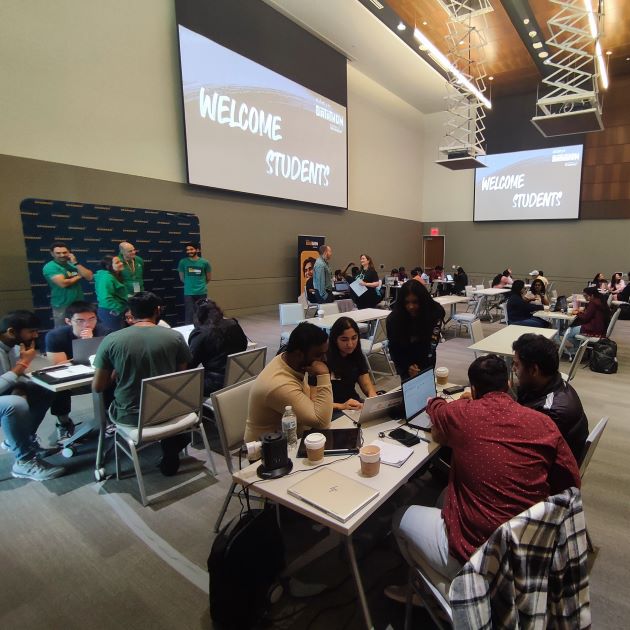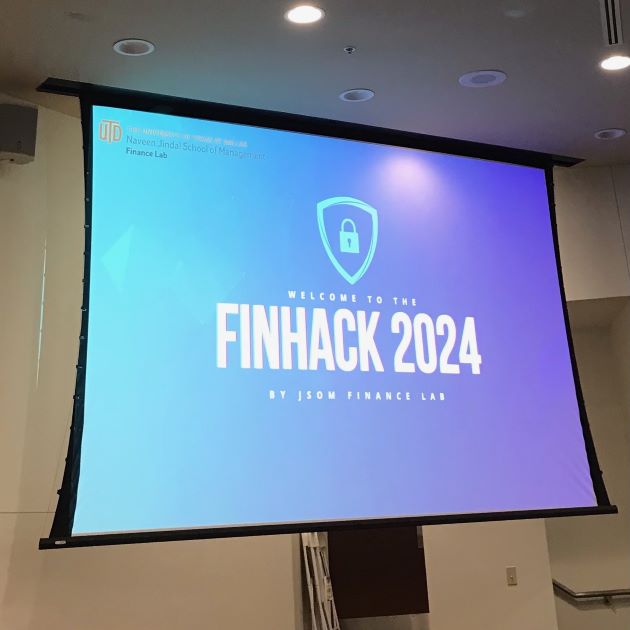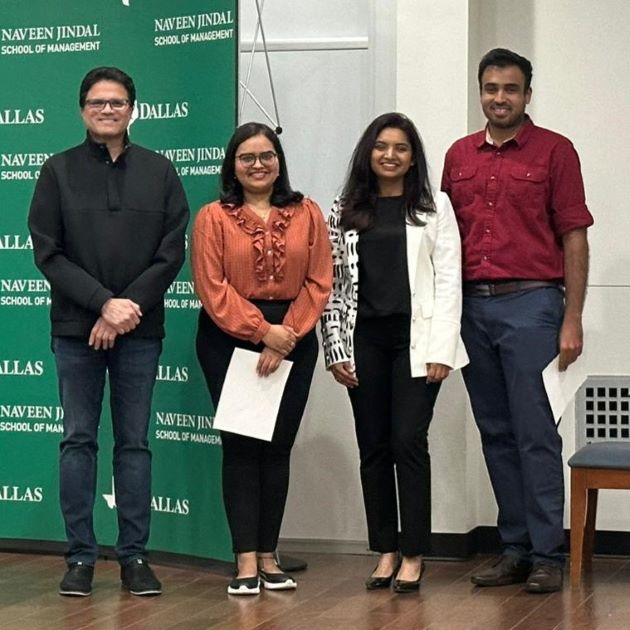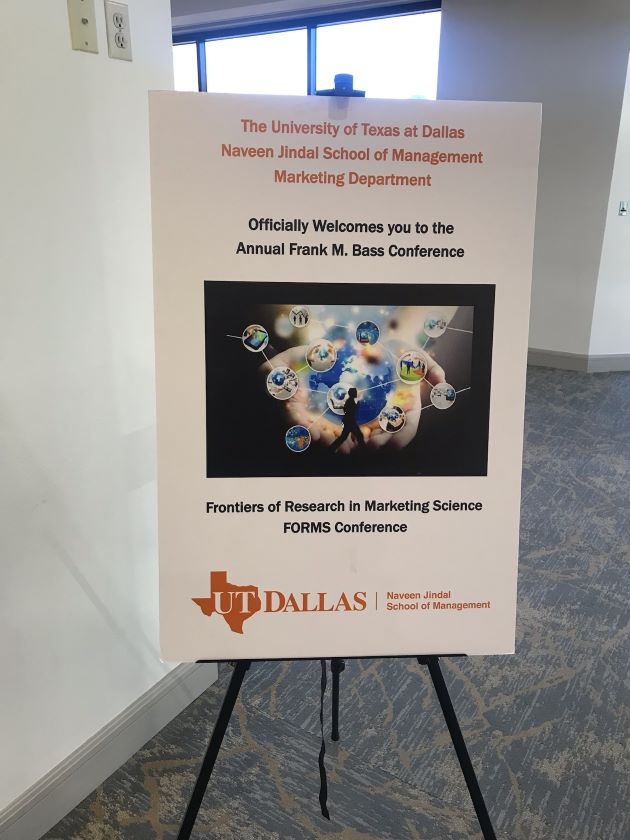
Presented Feb. 23-24 by the Naveen Jindal School of Management, the event offered analysis into an array of topics — from video games to AI to retail — providing a high-level arena for discussion as well as presentation. Attendees came from 59 universities in 9 countries, including India and China.
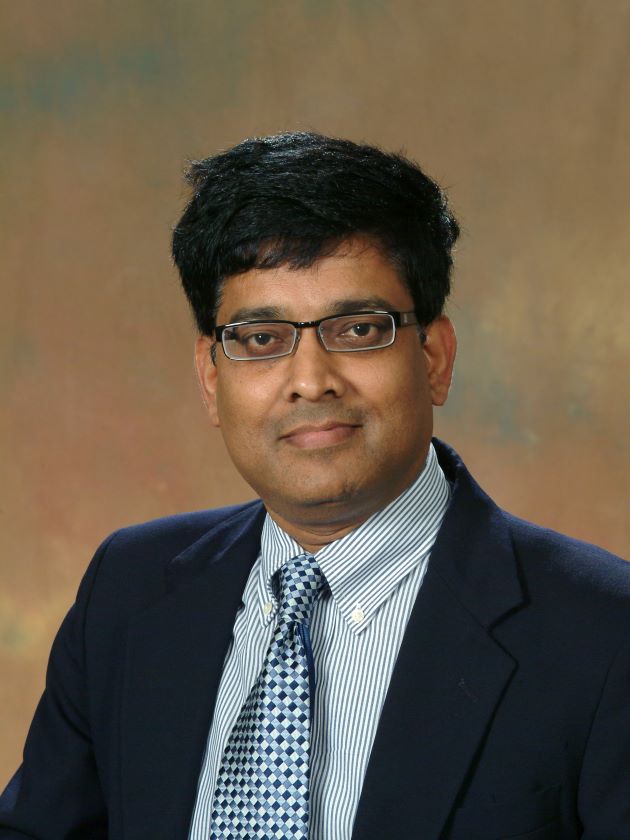
Dr. Sanjay Jain, O.P. Jindal Distinguished Chair and professor in the Jindal School’s Marketing Area and co-chair of the conference, was excited about where the conference is headed in multiple ways.
“The conference has grown much bigger over the years,” he said. “There were more than 130 submissions and people who come here form a high-quality group in terms of knowledge.”
The conference is named for the late Dr. Frank Bass, Eugene McDermott Professor of Management at the Jindal School who was often called The Father of Marketing Science, along with being the inventor of the hallmark Bass Diffusion Model, a mathematical framework used to predict the adoption and spread of new products or innovations within a population by considering both innovation adopters and imitators over time.
Range of Marketing Topics
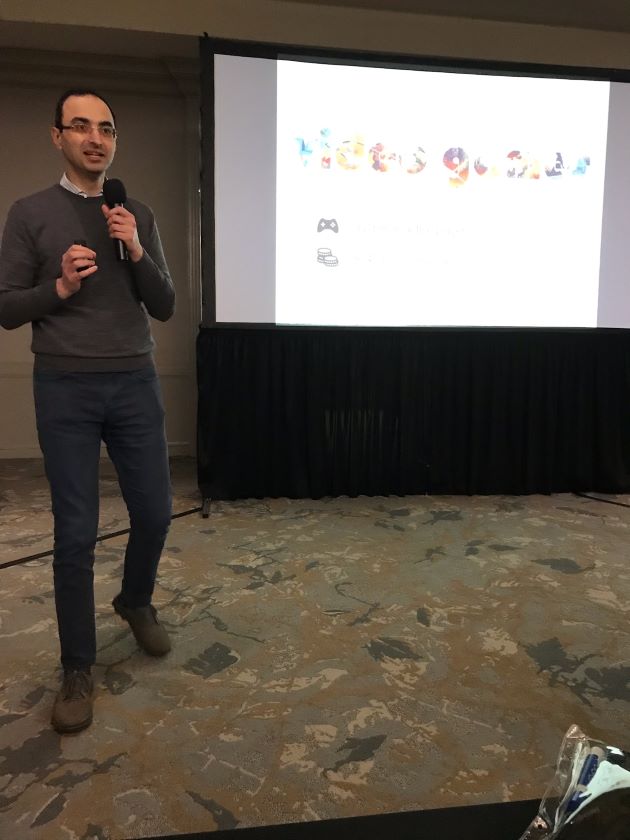
Many video games are free but the decision to buy add-ons can often be the difference between winning and losing, as it can be with paid games.
“If a developer is selling a pay-to-win add-on, the cost may be alienating players so you need to think about how they are going to compensate these players in some way to keep them on the platform — this can be moves such as decreasing the price, increasing the base product quality and reducing the power of the pay-to-win add-on,” Harutyunyan said after the talk. “All of this can help. Under conditions where you want to introduce a pay-to-win add-on, you want to think about how you design the game to balance winning and losing. With framing, you can manipulate how sensitive players become to losing versus winning. We show that you want to make them very sensitive to winning.”
Harutyunyan said even though gaming companies do not want that same response to losing, they do not want to make them insensitive, either.
“You just want to the find right balance,” he said. “You also look at cosmetic features vs. competitive features. Cosmetic doesn’t affect competitive outcomes, so they don’t give any advantage, but you find when you combine the two things when you sell the pay-to-win item becomes much more profitable so there is a kind of synergy.”
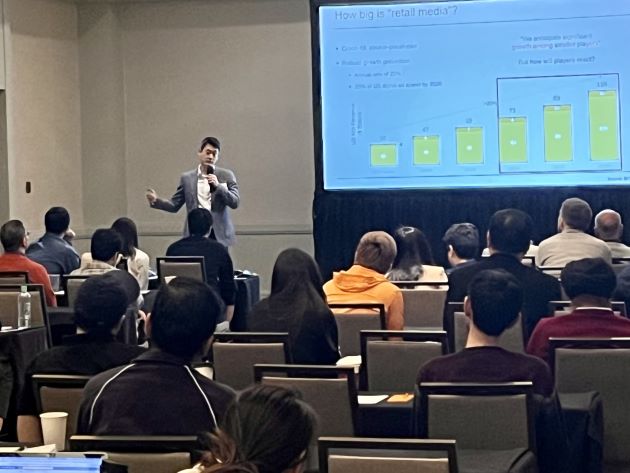
For the session “Retail Media and Manufacturer Response,” Dr. Jason Choi, assistant professor at the Robert H. Smith School of Business at the University of Maryland, shared in a slide that retail media will affect manufacturer channel strategies through prisoner’s dilemma, which will result in manufacturers selling directly.
Choi underscored a key takeaway from his presentation — while there is a great deal of excitement in selling ads on retailer platforms, his team’s analysis suggests maybe there can be some negative unintended effects.
“We’re talking especially for those who don’t have a lot of customer traffic in the first place,” he said. “Because intuitively by selling ads on your platforms that could actually make brands more averse to selling their products on the platform. It’s sort of counterintuitive because advertising should be helping them sell the products… because there is an arena for advertising competition on the retail platform — that itself could drive manufacturers away from selling on the retail platform. It’s a kind of cautionary tale for mid-sized or smaller retail platforms.”
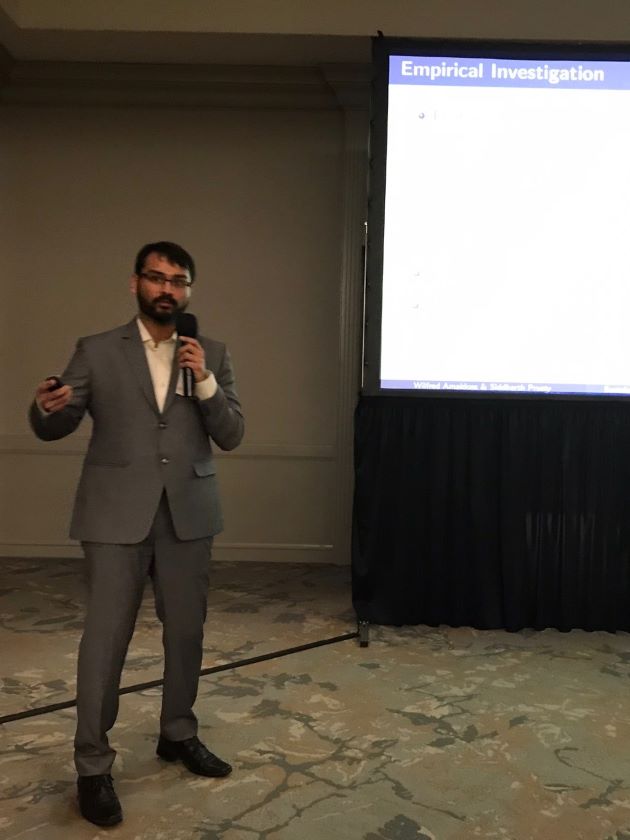
For the session “Sustainable Consumption: A Strategic Analysis,” Siddharth Prusty, a PhD candidate at the Fuqua School of Business at Duke University, mentioned sustainable luxury items, such as Citizen offering solar-powered watches and Porsche offering electric vehicles. From these mentions, one could have surmised it was leading into statistics on the positive financial effect of sustainability for luxury items. Even more so when Prusty also mentioned that there was a statement from the CEO of Kering that “Luxury and sustainability are one and the same.” But the research found that a luxury product offering sustainability doesn’t necessarily mean that it will become profitable. Prusty’s presentation, including within the slide portion, emphasized the need for caution when marketing luxury goods as sustainable because profits can decrease even if the price increases.
Insights and Perspectives
The conference’s format is very different from many others in marketing science, said co-chair Dr. P. K. Kannan, the Dean’s Chair in marketing science and associate dean for strategic initiatives at the University of Maryland’s Robert H. Smith School of Business.
“Many times you have about 20 minutes to present your paper and it’s just an overview of what you are doing and not much time to get into it,” he said, “but here we structure it where you have someone presenting for around 45 minutes and then you have a discussant who gets the paper, reviews the paper and gives critical comments on the paper.”
Kannan also pointed out that some conferences only require an abstract for submission while the Bass FORMS Conference requires the entire paper be sent for consideration.
“We want to try to make sure there is a variety in the topics,” Jain said. “We are focusing on quantitative marketing, but we are trying to make it broad in terms of topics.”
Kannan added that although the conference focuses on emerging issues in marketing, they also make sure to cover traditional subjects.
Jain believes the visibility the conference gives the Jindal School is very valuable.
“People come from so many parts of the world to be here,” he said. “Attendees are coming to the conference from Hong Kong, London and many other places…It’s popular.”
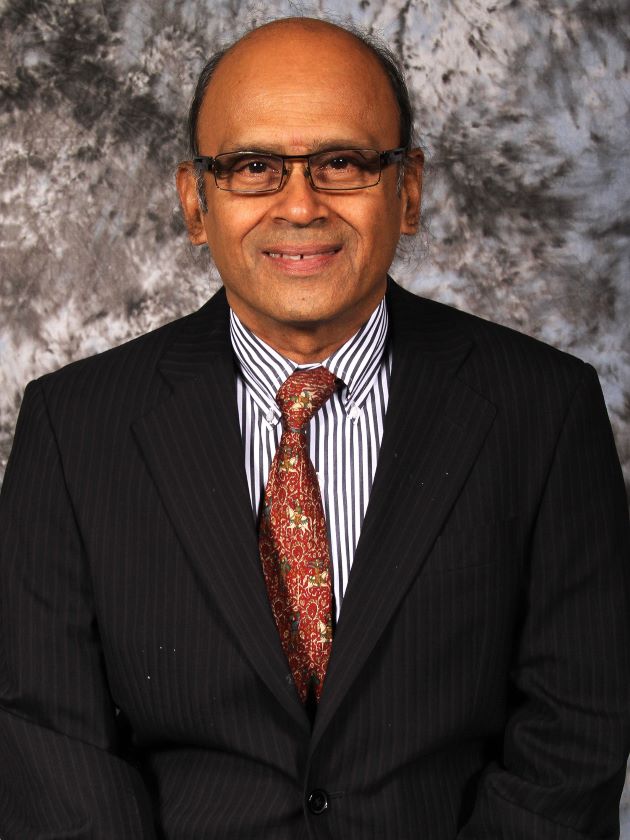
Dr. Ram Rao, Founders Professor in the Jindal School’s Marketing Area, believes a key advantage of the conference is that much of the work displayed is in the earlier stages.
“You think about the session on selling ads on platforms and it suggests, ‘Wait, maybe there are negative and unintended consequences of selling ads for certain sized companies,”’ he said. “It’s interesting and it’s about something truly relevant. Maybe some papers here are still not necessarily fully fleshed out…but, this is part of the point, to discuss and help someone’s research possibly. We are here to share. The world of marketing is proceeding with analytics but these researchers are bringing to bear something beyond number crunching. They are going beyond the data. It’s taking on a new avatar in the digital space. You go to the supermarket and there might be an ad for a product but how does it translate into the digital space? These are good questions to be asking.”
Dr. Tommaso Bondi, an assistant professor at Cornell University, values the conference as a chance to keep in touch with what is cutting edge but also when it comes to keeping in touch.
“You see new and old friends, it’s a good chance to catch up and see what people are up to research-wise,” he said. “It feels like most of us are here every February.”
The most intriguing session for Bondi was focused on a subject many have been buzzing about for some time.
“The standout to me… has been the paper on fake reviews — misinformation creating and affecting the way consumers think about even real reviews,” he said. “It really makes you think about what affects consumers.”
Dr. Manish Gangwar, associate professor at the Indian School of Business, doesn’t think it has to take much thought to want to travel a great distance to attend the conference.
“This is the conference where most people go for relevant information that just puts the focus on marketing,” he said. “All the sessions have been wonderful with great minds coming together to talk theory and talk about subjects that can affect the future. I’ve come here from India for 10 years and people are willing to invest the kind of time the travel may take because this is a top conference for marketing. The data is really interesting but there is so much analysis, discussion and an appreciation for the subject.”
Dr. Jagmohan Raju, professor at the University of Pennsylvania’s Wharton School, also feels the extra length for presentations along with having a discussant afterward is a key to the experience of the conference.
“I enjoyed the presentation that talked about how classic goods sometimes beat new goods,” he said. “I thought the modeling was strong. People often think of new as the best and, therefore, the most valuable. For televisions, that is often the case, for example. But here you really saw where it may not be the case and it can affect your point of view… It’s great to be shown a different way of thinking about something or expanding on a thought beyond what you considered…You just see deeper thinking at the conference and it can make us all better at what we are doing.”

